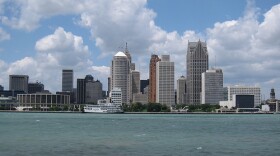Detroit isn’t exactly feeling the love in Washington these days.
Senate Republicans proposed amendments to a bill that would block any kind of possible bailout for Detroit.
And the White House has been largely silentabout the largest municipal bankruptcy filing in American history.
So why the lack of love for the Motor City? It’s not new—but it is complicated.
“Government workers union” paradise vs. “conservative utopia”
In the weeks since Detroit filed for bankruptcy, the chattering classes have been all over the story.
Chris Stirewalt explained the city’s demise—and why President Obama has said virtually nothing about it—on Fox News.
“The President doesn’t necessarily want to be associated with what is now the most infamous failure of that symbiotic relationship between Democrats and government worker unions,” Stirewalt opined.
Ok-- that’s one side’s spin. Over at MSNBC, Ed Schultz had Detroit pegged as a “conservative utopia.”
“Detroit, Michigan used to be a symbol of industrial strength in manufacturing in this country,” Schultz proclaimed. “But thanks to a lot of Republican policies, the city is now filing for bankruptcy.”
Neither one raises the specter of race, though that’s always understood as a factor when you talk Detroit—a city that’s about 85% black.
While these narratives are different, they do agree that Detroit is basically a ruined city--though you can take your pick as to who ruined it. And nobody’s offering the kind of help that, say, New York got when it stood on the brink of financial collapse in the 1970s.
So there’s lots of hand-wringing and finger-pointing about Detroit—but not a whole lot of love. So…why?
“There’s money here”
But to tackle that question, we first need to figure out what “Detroit” is. It turns out its shifting metropolitan geography has a lot to do with the city’s current predicament.
Downtown Detroit used to be a thriving retail center. But that’s long gone. For decades, money shifted outside the city limits, and retailers followed. Now, if you want to find upscale shopping in metro Detroit, you’ll probably head somewhere like the Somerset collection—which is about 10 miles north of the city in suburban Troy.
John Berna is eating Chinese food here at the food court. He’s one of hundreds of thousands of people in the area who lived in Detroit at one point, but now lives in the suburbs. He doesn’t have particularly fond memories.
“It’s embarrassing, sometimes, to tell you’re from Detroit,” Berna says. “You know I hate to say that, but that’s how I feel.”
Despite that, Berna says he retains some love for the city. But he thinks Detroit has earned its bad image.
“The city of Detroit itself…I think it deserves whatever reputation it gets,” Berna says. “There’s just so many years of mismanagement and corruption.”
It’s hard to argue that point. Detroit has had three mayors wind up in jail since the 1940s—most recently former mayor Kwame Kilpatrick, now in federal prison for running city hall like a “criminal enterprise.”
A group of national retail managers was sitting across the food court from Berna. They were trying to wrap their heads around the idea of a city just not being able to pay its bills.
“I was just talking to my colleagues here, about…how does that happen?”asked Ricky Cannon.
The group is here on business, and Cannon says they won’t have time to visit “the city” itself. And looking around at the Somerset Collection, he notes there’s really no need to.
“There’s money here,” Cannon says. “I don’t know if all the money left the city and came out to the different counties or what, but the city needs to try to generate some of those dollars back into the city.”
Leaving Detroit was “sort of like the 11th commandment”
So why isn’t that happening, at least not yet? While the reasons have lots to do with economic forces, they have has as much to do with psychology and emotion—how people feel about Detroit now.
“It’s just like the causes for Detroit’s current situation—I think the feelings about Detroit are complicated,” says Bill McGraw, former Detroit Free Press reporter and co-founder of Deadline Detroit.
McGraw says some people do just hate Detroit. That’s especially true for “people in Metro Detroit, who grew up in Detroit, who are say 55 and older, [and] who feel Detroit betrayed them in some way,” McGraw says. “Forgetting that their departures helped lead to Detroit’s current situation.”
Regardless of who’s at fault, there’s one particularly uncomfortable question in all of this--the significant role that race has played, and continues to play, in Detroit’s predicament.
Retired Detroit City Council member Sheila Cockrel says that race and racism has formed and “deformed” social relations in Detroit—and its economy. Even when the city was thriving, there was always a sense that people should hurry up and get out.
“It was sort of like the 11th commandment: Thou shalt leave Detroit if you are a working class or middle class white person, as fast as you can. And that having left Detroit, one will turn one’s back,” Cockrel says.
And so the city lost much of its tax base, which set up a lingering dynamic of black city versus white suburb. And now, both sides like to angrily blame the other for the city’s crisis.
Both McGraw and Cockrel agree, though, that greater regionalism in southeast Michigan is a good place to start to look for solutions. But with distrust and animosity still running high in the region, that’s about as likely in the near term as Detroit getting a bailout.






